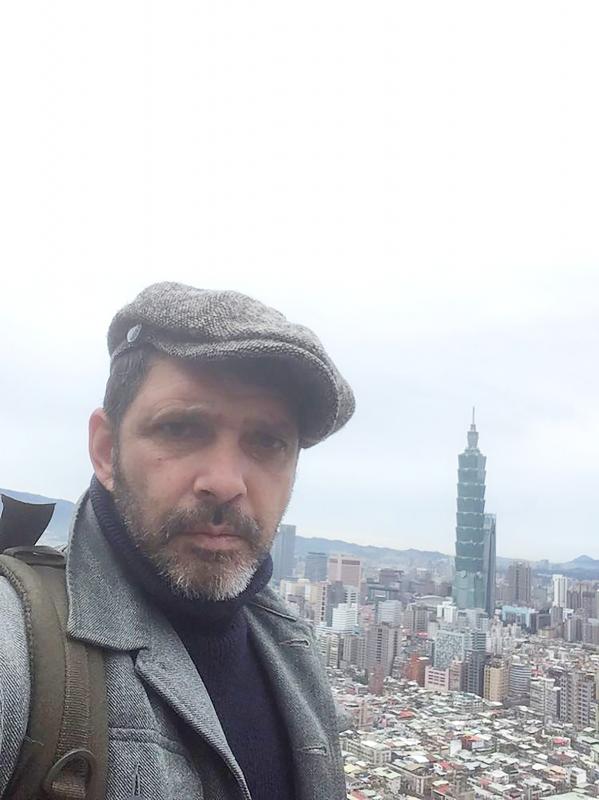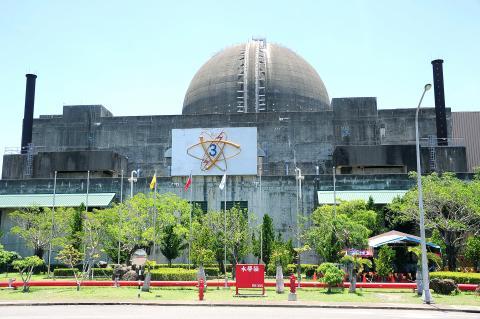Taiwan’s story of being the world’s only functional and democratic pariah state inspired the making of Taiwan vs. China: A Fragile Democracy, the film’s French director Alain Lewkowicz said.
The documentary was screened this year at the International Film Festival and Forum on Human Rights in Geneva, Switzerland, and the Festival International de Programmes Audiovisuels (International Documentary Festival) in Biarritz, France.
That Taiwan democratically elects its president and has its own currency, passport and constitution but remains unrecognized by the international community is a an unprecedented situation that should alarm the world, Lewkowicz said.

Photo courtesy of Alain Lewkowicz via CNA
“An abandonment of Taiwan at the face of Chinese aggression would spell the end of ... Western-style democracy,” he said.
The film is aimed at the majority of French who know little about Taiwan or not at all, he said, adding the documentary emphasizes the contrast between the precarious situation besetting the country and its innovative democracy.
After the public television channel ARTE broadcast the documentary in Europe, many French viewers reached out to say they had never heard about Taiwan or its security issues before, he said.
Many audience members also expressed fascination with Minister Without Portfolio Audrey Tang (唐鳳), who was heavily featured in the film as Taiwan’s transgender “hacktivist” and an anarchist who became a government minister, he said.
Compared with Taiwan’s dynamism and innovation, French democracy is ancient, centralized, impersonal and opaque, he said, adding that it is a point not lost on French viewers.
“We have perceived Taiwan from China’s perspective for too long,” Lewkowicz said. “This film is intended to show that perhaps seeing China from Taiwan’s perspective is the proper way to understand the threat China poses to the world.”
The film also gives voice to the will of Taiwanese who wish to be themselves and not an appendage to China, and to show that Taiwan will not relinquish democracy as China had done, he said.
The COVID-19 pandemic has given a significant boost to Taiwan’s international profile, and the country’s public health policies toward fighting the virus have often been discussed in France, he said.
The pandemic broke France’s two-decade-long infatuation with China, Lewkowicz said, adding that the public is fearful of Beijing as a military and economic hegemony.
In contrast to other countries, Taiwan’s democratic institutions were unified by COVID-19, he said.
The public’s quick acceptance of emergency measures and the political consensus on public health policy enhanced Taiwan’s image in France, he said.
“This is not to say Taiwan is without flaws, which is the reason I used [the term] ‘a fragile democracy,’” he said.
Taiwan should recognize the dangers of not being recognized by other democratic nations, being under the threat of hegemonic China and the unresolved crisis of generational transitional justice in its society, he said.
Internal social justice issues prevented a full reconciliation between the victims and perpetrators of repression during the authoritarian era, he said.
Taiwan’s innovative democracy has fascinated Lewkowicz, especially the creation of digital democratic tools by “hacker activists” that have changed the way people think about politics and governance, he said.

A fugitive in a suspected cosmetic surgery fraud case today returned to Taiwan from Canada, after being wanted for six years. Internet celebrity Su Chen-tuan (蘇陳端), known as Lady Nai Nai (貴婦奈奈), and her former boyfriend, plastic surgeon Paul Huang (黃博健), allegedly defrauded clients and friends of about NT$1 billion (US$30.66 million). Su was put on a wanted list in 2019 when she lived in Toronto, Canada, after failing to respond to subpoenas and arrest warrants from the Taipei District Prosecutors’ Office. Su arrived at Taiwan Taoyuan International Airport at 5am today on an EVA Air flight accompanied by a

An essay competition jointly organized by a local writing society and a publisher affiliated with the Chinese Communist Party (CCP) might have contravened the Act Governing Relations Between the People of the Taiwan Area and the Mainland Area (臺灣地區與大陸地區人民關係條例), the Mainland Affairs Council (MAC) said on Thursday. “In this case, the partner organization is clearly an agency under the CCP’s Fujian Provincial Committee,” MAC Deputy Minister and spokesperson Liang Wen-chieh (梁文傑) said at a news briefing in Taipei. “It also involves bringing Taiwanese students to China with all-expenses-paid arrangements to attend award ceremonies and camps,” Liang said. Those two “characteristics” are typically sufficient

A magnitude 5.9 earthquake that struck about 33km off the coast of Hualien City was the "main shock" in a series of quakes in the area, with aftershocks expected over the next three days, the Central Weather Administration (CWA) said yesterday. Prior to the magnitude 5.9 quake shaking most of Taiwan at 6:53pm yesterday, six other earthquakes stronger than a magnitude of 4, starting with a magnitude 5.5 quake at 6:09pm, occurred in the area. CWA Seismological Center Director Wu Chien-fu (吳健富) confirmed that the quakes were all part of the same series and that the magnitude 5.5 temblor was

Restarting the No. 2 reactor at the Ma-anshan Nuclear Power Plant would take up to 18 months, Minister of Economic Affairs J.W. Kuo (郭智輝) said today. Kuo was answering questions during a meeting of the Legislative Yuan’s Economics Committee, where legislators are considering amendments to the Renewable Energy Development Act (再生能源發展條) amid concerns about the consequences of the Pingtung County reactor’s decommissioning scheduled for May 17. Its decommissioning is to mark the end of Taiwan’s nuclear power production. However, Chinese Nationalist Party (KMT) lawmakers have proposed an amendment to the Nuclear Reactor Facilities Regulation Act (核子反應器設施管制法) that would extend the life of existing